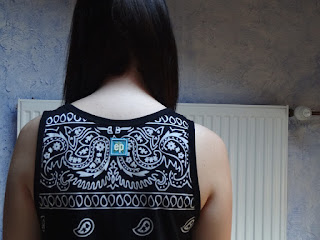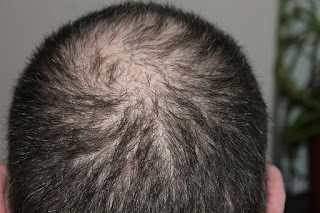Alopecia - Illnesses that cause hair loss
Definition
Alopecia refers to temporary or permanent moderate or heavy hair loss . A hair loss is considered abnormal beyond a loss of 100 hairs a day.
Alopecia can be acute or chronic. This aesthetic and psychological problem can also be the first sign of an underlying pathology.
Hair loss can reach the entire scalp or only affect a well-defined area.
She can touch the man, the woman and the child indifferently.
In humans, hair loss often begins before age 40 (the disorder can also begin just after puberty and be much more severe). The occurrence of moderate alopecia around 30 years is much less worrying if there is a family history (father, grandfather ...).
In women, alopecia usually occurs a little later.
Cause (s)
The alopecia may be the first sign of an underlying disease still unknown:
- iron deficiency
- hypo or hyperthyroidism
- certain conditions such as ringworm, lupus ...
It can also occur as a result of certain treatments (chemotherapy, anticoagulants), after childbirth or at menopause.
Different factors intervene and conditioning the importance of hair loss:
- heredity
- hormones: hair growth depends on androgens, male hormones, also present in women. Androgen sensitivity varies from one individual to another.
- lifestyle: stress, medication, diet ... many environmental parameters that affect the lifespan of hair.
Symptom (s)
Alopecia can be acute or chronic. The main form of chronic alopecia is so-called androgenic alopecia , because it is due to hypersensitization of the androgenic hair follicle.
The alopecia acute is characterized by sudden extreme hair loss and diffuse throughout the scalp. Limited in time, it is reversible.
The symptoms of chronic alopecia are generally as follows:
- the hair gradually diminishes and the hair becomes thinner, even fluffy
- the hair becomes scarce or disappear on the whole skull or in plates.
In humans, the forehead and the temples gradually become thin, and the region of the top of the skull is reached.
In women, the frontal line of implantation is generally well respected. Alopecia often affects the area just behind this line and the top of the skull.
Other signs (itching, burning ...) can occur, but they are quite rare.
Prevention Council (s)
In order to keep hair healthy and to limit the factors aggravating alopecia , it is important to respect a few simple everyday actions:
- washing the hair regularly gives them more volume and helps to conceal hair loss
- do not abuse aggressive products (coloring ...)
- dry hair naturally rather than by electric dryer or iron straightener
- eat balanced to avoid deficiencies: the hair feeds through the blood vessels of the scalp. Certain minerals and vitamins contribute to the good health of the hair
- avoid stress because in excess, it can contribute to hair loss
- protect the hair from the sun: a significant exposure to ultraviolet rays the abyss
- avoid tight hairstyles (buns, mats, pliers) that make hair brittle.
Treatment of alopecia in men
- Man is treated first locally with the application of solutions (minoxidil-based) stimulating hair growth.
- Taking tablets (finasteride) is also possible.
- When the results are not satisfactory, surgery can be considered ( transplant or micro- graft of hair).
Treatment of alopecia in women
- In the absence of any contraindications, the woman is often treated with anti-androgens (hormonal treatment).
- Local care is also recommended, but its effects are limited.
- Surgical techniques are just as satisfactory for women.
- Overall, dietary supplements can have a beneficial effect.
- The wig can be a real comfort and avoid the psychological consequences.
- Mesotherapy (local micro-injections of various products) can be effective.
For both sexes, homeopathy and aromatherapy may be helpful in cases of alopecia.
Homeopathy
In alopecia, homeopathy can be useful in addition to a suitable treatment.
According to the symptoms, take the indicated remedy:
- in case of hair loss: Thallium sulfuricum 9 CH, 3 granules every day
- if it is a pregnant woman or having just given birth: Sepia officinalis 9 CH, 3 granules 3 times a day
- if the fall is accompanied by white hair: Phosphoricum acidum 9 CH, 3 granules 3 times a day.
Aromatherapy
Aromatherapy can relieve the symptoms of alopecia . The following treatments can be effective.
- Make a mask in application: mix 10 drops of thujanol thyme, 10 drops of rosemary, 50 drops of ylang ylang and 100 ml of olive oil to which you have added a little wheat germ oil. Apply this mask, line by line, and massage with the fingertips by "moving" the scalp to penetrate.
- Then shampoo with 1 drop of thyme. Another recipe: mix 30 drops of lavender, 30 drops of bitter orange, 10 drops of thyme and 100 ml of olive oil for the same use.





Comments
Post a Comment